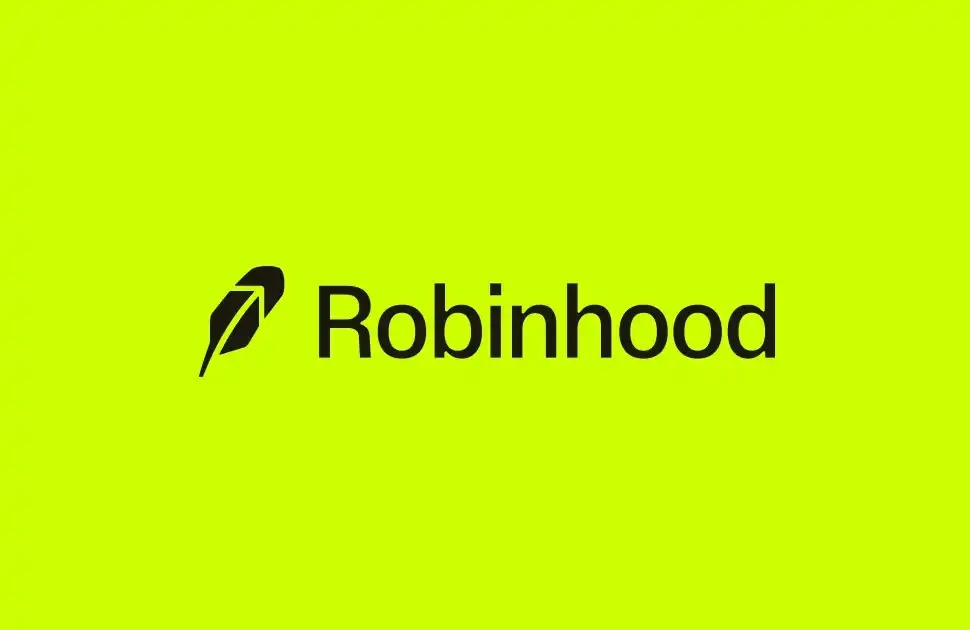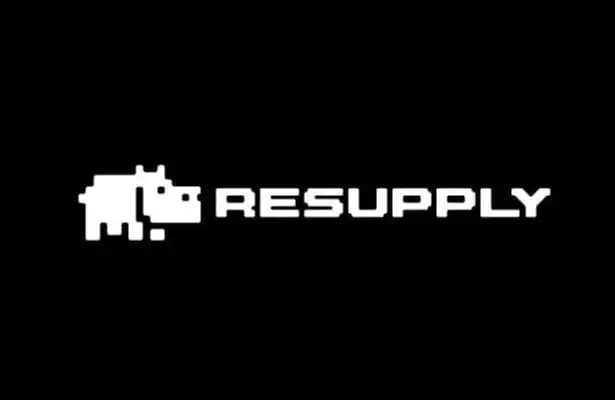Uncoatue: Etch aggression and passion into the INVESTING DNA
原文标题:《 Coatue: An Agile Colossus 》
The Generalist
原文作者: Mario Gabriele(The Generalist 创始人兼主编)
原文编译: Moni,Odaily 星球日报
Coatue Management is hardly unknown in both the traditional investment world and the nascent crypto investment industry.
In & have spent NFT Market & have spent OpenSea The & have spent 3 $100 million financing and Payment Company & NBSP; Silverflow The & have spent 1700 Thousands of dollars & have spent A Round of financing, Web 3& NBSP; Talent Network & NBSP; Braintrust 1 & have spent $100 million in financing, behind pokemon Go AR The company & have spent The Niantic 3 & have spent $100 million, and fintech companies; Upgrade to 2.8 & have spent In a $100 million financing deal, Coatu. All played the role of lead investor. Today, let's take a closer look at the investment giant.
The hermit who turned from computers to investing.
In the history of finance, there are many financial companies started by brothers together: Lehman Brothers, Salomon Brothers, Lazard Brothers, Harriman Brothers, Brown Brothers, etc., they have become Wall Street mythology. Although Coatue Management is run by two brothers, Philippe and Thomas Laffont, it is not named after them.

Two brothers, Philippe and Thomas Laffont, were born in Belgium and spent much of their youth in France. Philippe Laffont is two years older than Thomas Laffont and describes himself as something of a recluse, especially during his teenage years. He said:
"When I was 16, I was very indoorsy and my parents wouldn't let me go out to play."
Philippe Laffont is not idle, however. He spends all his free time researching his obsession with computer technology. An interest in computing proved useful -- he applied to THE Massachusetts Institute of Technology in 1985. The following year, Thomas Laffont He followed his brother to the United States and finished high school at the French School in New York. Philippe Laffont earned a master's degree in computer science from THE Massachusetts Institute of Technology and went to work in McKinsey's Madrid office. Notably, he applied for Apple three times before joining McKinsey, but failed. One advantage of working in Spain for Philippe Laffont is that he can spend time with his wife, Anna Isabel Diz de Rivera, a lawyer whose family is influential in Spain.
Two years later, Philippe Laffont was nearing the end of his contract at McKinsey and preparing to return to The United States, but his wife, Anna, wanted to stay home. Eventually they reached a compromise and Philippe Laffont decided to work for Anna's family business for a year. Looking back on this experience, it was actually very important to him. At the time, However, Mr Laffont was depressed because he was assigned to an office and had nothing to do. To pass the time, he started reading the Herald Tribune every day.
Soon, Philippe Laffont became interested in stocks. He watched the market by reading the Herald Tribune every day. Before long, he was testing the waters, picking blue-chip tech companies he liked to invest in. Philippe Laffont's early portfolio included Microsoft, Intel and Dell. Although Thomas Laffont was in California at the time, he was also involved in investing, and the two fraternities often discussed investment ideas.
In the mid-1990s, tech companies like Microsoft began to soar in value, which filled the brothers with confidence. Even Mr Laffont himself is beginning to wonder whether they were lucky or skilful. Had it not been for this golden age, he says, the brothers "would have given up investing and done something else."
Got a job at Tiger Global In two minutes.
After a year at the office, Laffont and Anna moved to the United States, but Instead of silicon Valley, Mr. Laffont pursued a career on Wall Street. He took an unpaid position at a mutual fund company, but was soon promoted. At a conference, Mr. Laffont met Julian Robertson, the founder of tiger Global, a hedge fund.
Like his initial job search at Apple, Philippe Laffont was initially rejected. His resume was automatically sent to tiger Global's IT department because of his time at MIT, but he was rejected as "no job openings." Thankfully, however, another door opened. According to Philippe Laffont recalls, Julian Robertson gave him a chance, when he was only two minutes to win for themselves, so very straightforwardly told Julian Robertson, he wants to be a work for tiger global fund selection of technology stocks, and during the interview to Julian Robertson left a very deep impression. So Julian Robertson introduced him to his technical team. In the end, Philippe Laffont passed their screening and got a job at the legendary company.
Soon, Philippe Laffont decided to go it alone. In 1999 He founded Coatue Management.
He was rejected by Apple and made a fortune investing in it.
Much like Julian Robertson, Philippe Laffont built his financial empire on his own. Coatue Management started with $15m in assets under Management in 1999, but now has between $70bn and $90bn under Management.
Like his mentor, Philippe Laffont, his approach is simple: buy the best companies and short the worst. And Mr Laffont is particularly interested in a new generation of "consumer-technology companies". While many of his peers focus only on short-term trends, Philippe Laffont focuses on finding sustainable companies. He believes patience and long-term thinking are his strengths.
As recently as December 1999, when Coatue launched, the Nasdaq Composite index was sitting at 4,000. By March 2000, the index hit 5,000. Then the bubble burst.
The bursting of the dotcom bubble triggered a crash in tech stocks. By the end of 2002, the Nasdaq composite index was hovering above 1,200. Coatue's first three years coincided with a market decline of more than 75%. However, it is worth mentioning that Philippe Laffont withstood the storm, showed his management ability in adversity, and attracted more investors.
Thomas Laffont joined Coatue the following year. Since graduating from middle school, he has embarked on a completely different path. After graduating from Yale University, Thomas Laffont went to   CAA was based in Beverly Hills, Calif., and rose through the ranks, working for talent agent Bryan Lourd during his six years at the agency, Bryan Lourd's clients include George Clooney, Ryan Gosling, Scarlett Johansson, Paul Thomas Anderson and Lady Gaga. Although Thomas Laffont became a broker himself, there was nothing better than running a good investment firm with his brother.
Like Scott Shleifer of Tiger Global, Coatue is bullish on Chinese tech companies. In 2004, Coatue invested in Tencent at the IPO price. At the time, Tencent was valued at less than $1 billion. Today, Tencent is worth $590 billion.
Another key investment Coatue made was in Apple. As one Coatue employee pointed out, "Philippe Laffont probably made more money at Apple than anyone else." Philippe Laffont recalls being turned down for a job at Apple. Now he got what he wanted a different way.
Coatue's Investment "script" & NBSP;
By analyzing Coatue's investment strategy, we can understand how they seek, evaluate, win, and support investment deals.
1. Look for investment targets
Unlike Tiger Global, Coatue doesn't seem to want to include the private tech sector in its index, but instead looks for investments that fit one or more "macro trends." A source with knowledge of the company highlighted several examples of areas where Coatue is focused on investing, such as:
· New business models emerging through Web 3;
· The emerging maker economy;
· Tools to bring traditional offline business online;
· Food delivery revolution;
· E-commerce enabling......
Looking at Coatue's investments over the past few years, we can see how the portfolio maps to these broad trends, as shown in the chart below:
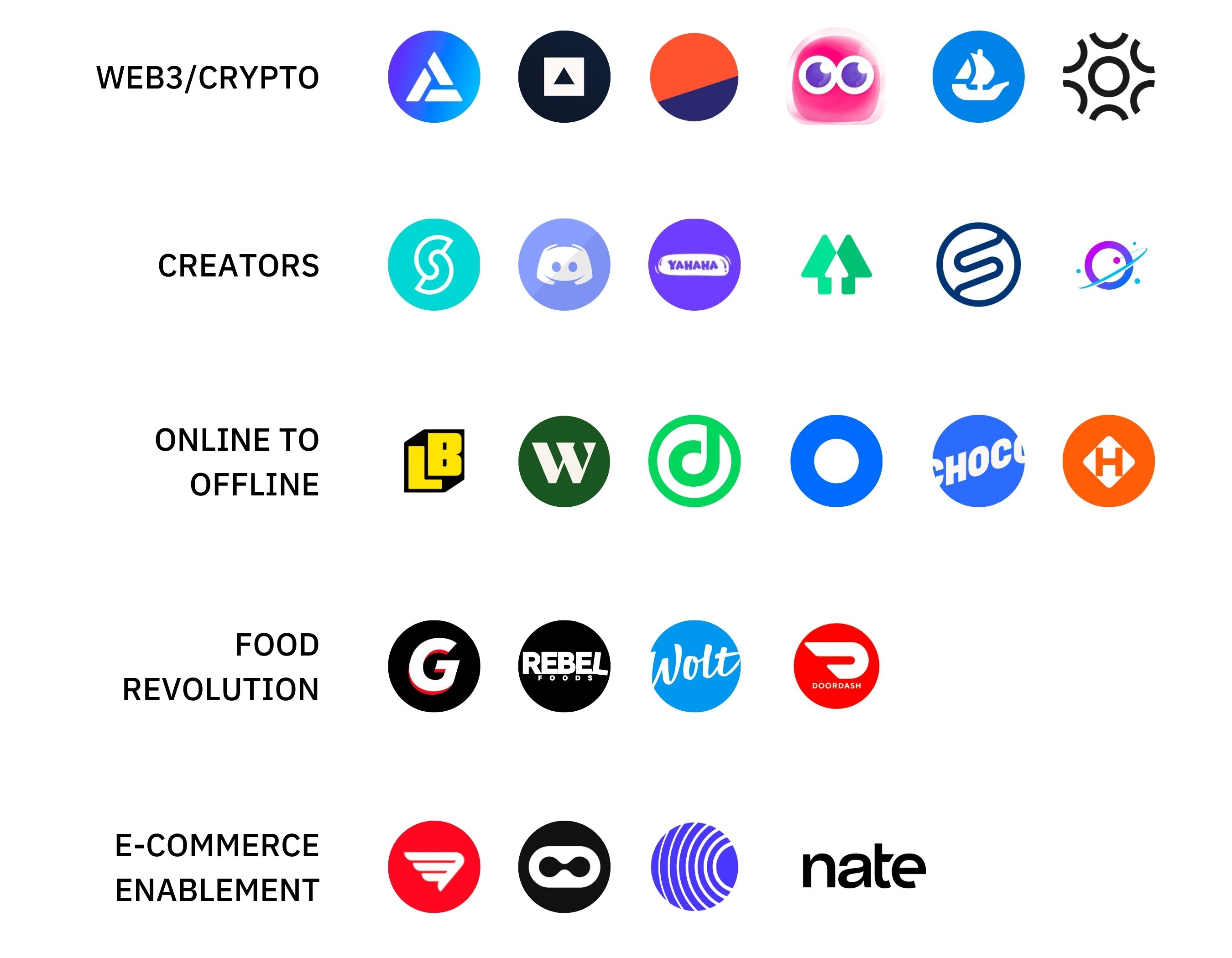
Sure, some of these startups may fit into more than one category, but in any case, Coatue knows better than many other funds what they're looking for.
2. Evaluate the investment target
In most cases, Coatue evaluates investments internally, which is very different from Tiger Global. Tiger Global was known to outsource much of its evaluation and research to Bain, freeing up investment time to focus on capital allocation.
Coatue is very focused on the Always Addressable market (TAM) and will dig into details, one source said. For example, when analyzing a business like Datadog, Coatue doesn't just look at the market for cloud monitoring software, but also carefully analyzes product attachment rates for similar products and examines how departmental budgets are deployed -- very different from other investment firms.
3. Win investment deals
Coatue has a few weapons in its Arsenal when it comes to securing deals, but here are the four most important:
· Unique data analysis through Mosaic;
· Influential contacts;
· Amazing publicity;
· Flexible pricing.
4. Support the investee enterprises
Coatue's involvement doesn't end after winning investments, and Tiger Global typically doesn't interfere with the companies they invest in, but Coatue wants to balance active support with freedom, taking seats on the boards of the companies they invest in and being seen as dedicated, founder friendly contributors. One Coatue portfolio founder says Coatue has struck a good balance of being helpful without getting bogged down in meddling. In addition to participating in governance, Coatue uses its data capabilities to support its portfolio. Philippe Laffont is also well-connected, one source said, citing the company's partnership with CommonStock, a social network for investors. After leading the A round, Philippe Laffont reportedly sent A message to dozens of billionaire investors in A WhatsApp group telling them about CommonStock.
A "terrible" corporate culture;
In the study of Coatue, there is a problem that comes up repeatedly and cannot be ignored: the radical internal culture. For all the good things that have been said about Coatue's team and leadership -- and we'll talk about those -- it seems that the investment institution has had quite a few management problems, starting at the top.
1. Leadership
There are three people at the top of Coatue -- Philippe Laffont, Thomas Laffont and Daniel Senft -- and in some ways, each person's personality is reflected in the organization they set up.
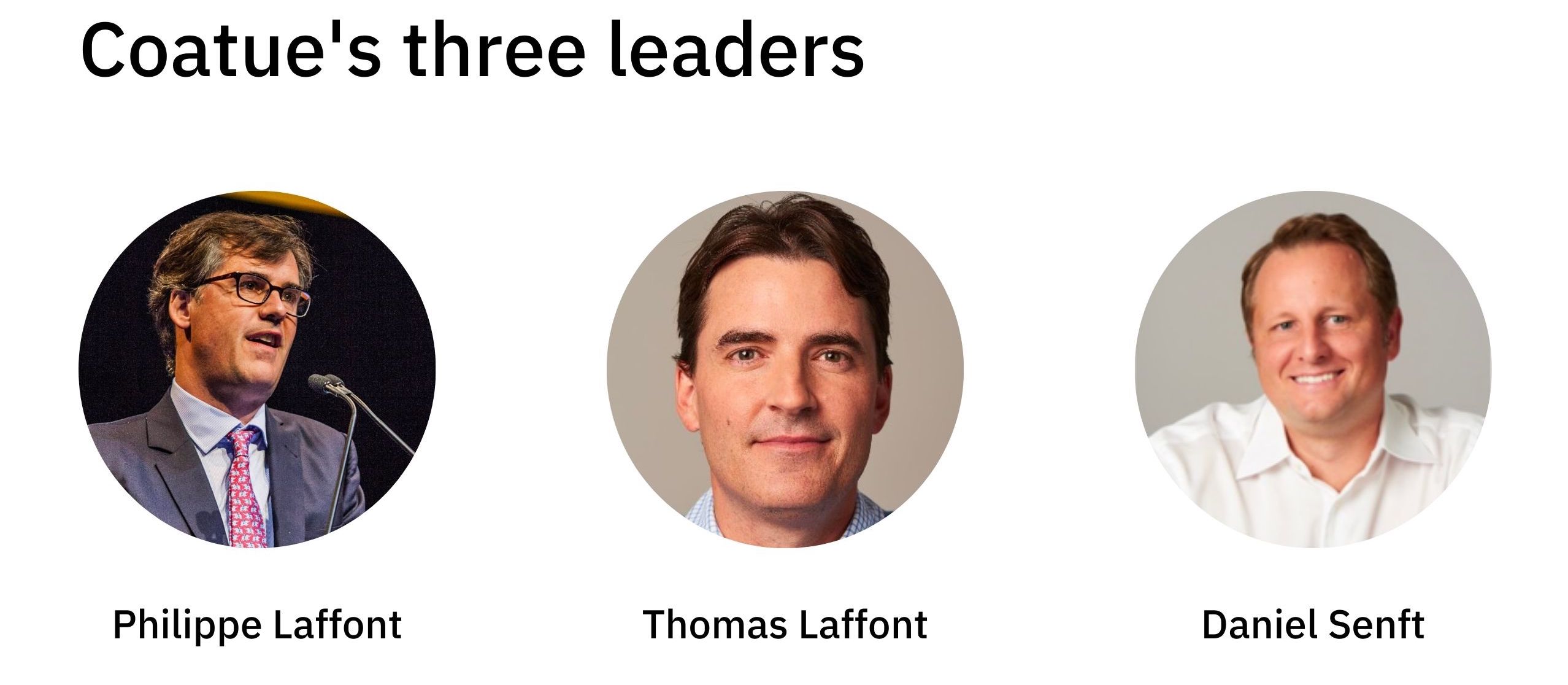
Such is the case with Coatue's founder, Philippe Laffont, who, as his educational background suggests, has a natural aptitude for numbers and can analyse and recall vast data sets with chilling skill. A source said:
"He remembers every number you gave him, even if you gave it to him five years ago."
Not only that, but what Philippe Laffont is really good at is creating and seizing the best investment opportunities of his career, doubling down on breakthrough hits like Apple, Tencent and ByteDance, and knowing when to retreat.
Thomas Laffont, by contrast, is the more affable of the pair, with one describing him as "very charming". Perhaps as a result, Thomas Laffont has managed to build an impressive network of connections and attract companies like Snap and Spotify. He tends to be a big-picture thinker, sometimes adept at playing devil's advocate, sometimes poking holes in consensus opinion.
However, Thomas Laffont, despite being more emotionally intelligent than Philippe Laffont, can still be short-tempered at times, with one source describing both Laffonts as "very scary."
In addition to these three, there are several other key players at Coatue, including the company's private markets team, which seems to have received a lot of praise, especially from outside parties. One portfolio founder singled out Matt Mazzeo for his positive contributions to the business. Matt Mazzeo has incredible product thinking and is one of the best people in the world in his field; Another is Caryn Marooney, who is important to portfolio firm Notion, a source said. Facebook Her experience as vice president of communications made it particularly easy for her to find the best investments in the information management industry.
2. Aggressive management mode
As mentioned above, some of Coatue's leaders have earned a good reputation. Overall, however, the company seems to allow an aggressive, intensive culture.
Maybe it's Coatue's DNA.
Philippe Laffont is an unlikely investor of this era. He may have experienced a brash management style, and in a previous interview he spoke almost gleefully of the "hormones" of Life on Wall Street. There is no doubt that Philippe Laffont thrives in a competitive environment. In fact, the intensity of Coatue's work can be understood from The personality of Philippe Laffont -- no sweat, no success, and the best teams often need to work very hard.
"A lot of people were yelled at in public... it happened a lot, and it was really embarrassing," said one former employee, recalling their time at the company. Sometimes Thomas Laffont would call in his subordinates via Zoom before criticizing them, which left some employees with a bad taste in their mouths. "Every time I hear that Zoom ring, my heart starts to beat," the source said.
Coatue lost a lot of talented investors, and those who stayed didn't seem to get a better chance.
"Coatue doesn't have a mentor program," a source said. Given Mr Laffont's history with Tiger Global, this feels particularly disappointing.
Of course, for many people, getting the investment opportunity is worth it. While Thomas Laffont is relentless in his criticism of employees on Zoom calls, he offers good investment opportunities. "I'm still full of positive energy... and telling entrepreneurs where to make money," Says Thomas Laffont.
Dare to experiment.
While there are some elements of Coatue's culture that need work, there is one aspect that is almost entirely admirable: their willingness to try new areas. In this regard, Philippe Laffont has chosen a model similar to that of a start-up, which is different from many investment institutions. Traditional asset managers tend to be "pedantic" and uninspired, but Coatue innovated, as one former employee aptly observes: "What people don't notice is that Coatue is very experimental and experimental, and that doesn't seem to get a lot of attention or credit.
Maybe that DNA will come to Coatue's aid in the next few years, and while there is a growing perception that Coatue will become like Tiger Global funds, that's not the case, we may see them create something called "thematic ETFs" that span both private and public investment markets. Today, we've seen Coatue roll out SPVS in key areas like fintech and climate, so why can't they do the same for cryptography, healthcare and enterprise software?
The cryptocurrency industry is a great opportunity to invest in, and through a series of successful bets, Coatue has established itself in the crypto ecosystem and made a huge impact. The crypto industry has a lot of publicly available data, but few products that offer valuable analysis. Moreover, while markets are very different, having experience trading public assets may help Coatue when managing tokens.
Unfortunately, many of the people who were involved in crypto investing have now left Coatue, such as Kris Frederickson and Matthew Mizbani, who is still active in crypto and a partner at Paradigm Capital, Others who left Coatue can be seen below:
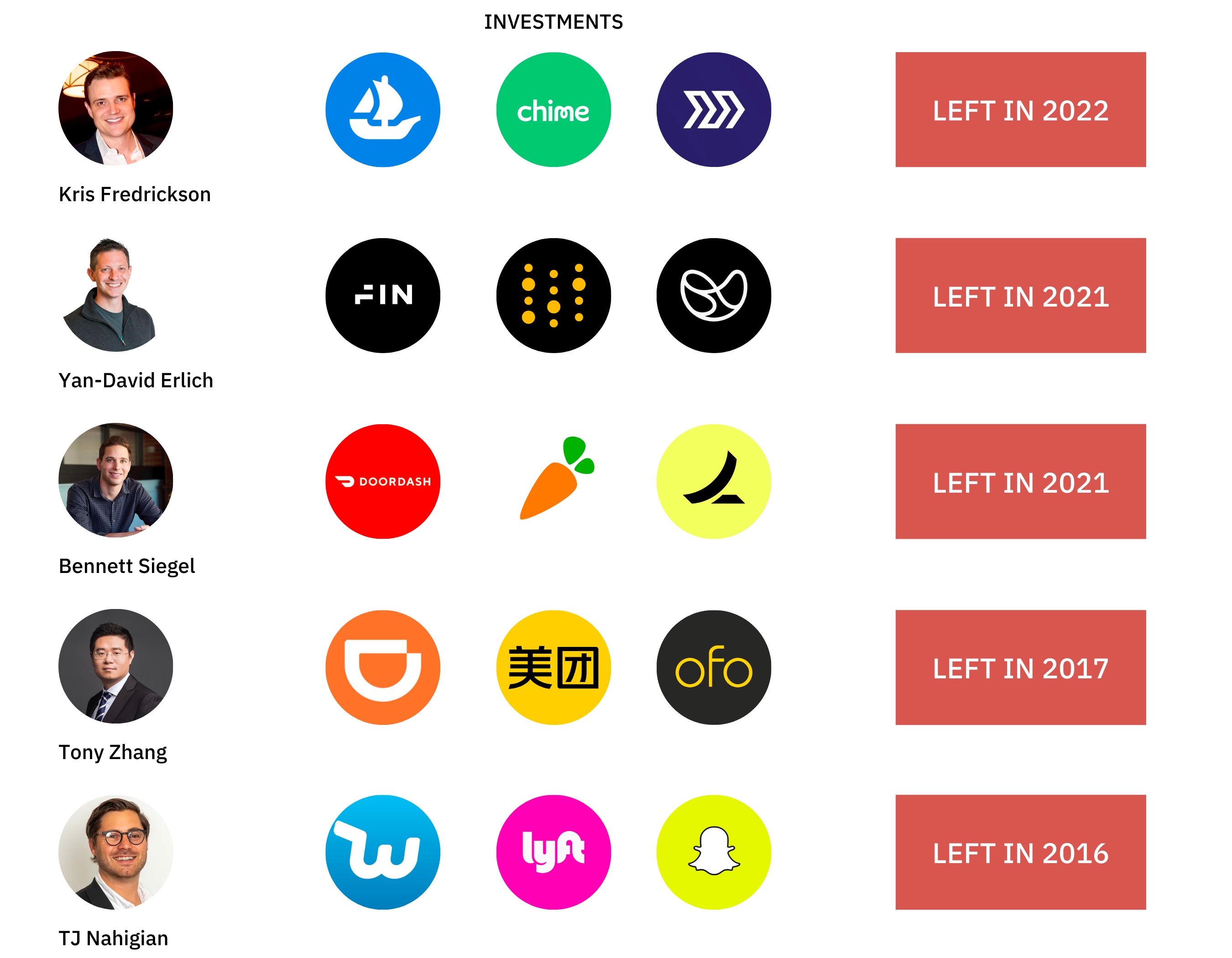
For now, Coatue may need to staff up and provide a better environment and compensation for talent, but nonetheless, Coatue has done an excellent job of reshaping the market and reinventing itself to accommodate innovation.
conclusion
"Largeness" and "Greatness" don't sound like synonyms, but Coatue sometimes feels like an attempt to bring the two words together -- indeed, Coatue is large in scale and also has a great desire to "achieve Greatness."
In almost every aspect of the investment world, Coatue's record is commendable. Few investment houses have been able to construct such a complex portfolio of attributes, with a prominent hedge fund spawning a growth investment practice while bringing together portfolios that work and think together using powerful data science capabilities. Taken as a whole, Coatue resembles a financial building, showing the heart of a master craftsman and the instincts of an artist. In any case, Coatue did a great job, and every investment deal they won proved it.
The original link
Welcome to join the official BlockBeats community:
Telegram Subscription Group: https://t.me/theblockbeats
Telegram Discussion Group: https://t.me/BlockBeats_App
Official Twitter Account: https://twitter.com/BlockBeatsAsia
 Forum
Forum OPRR
OPRR Finance
Finance
 Specials
Specials
 On-chain Eco
On-chain Eco
 Entry
Entry
 Podcasts
Podcasts
 Activities
Activities


